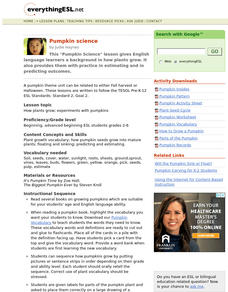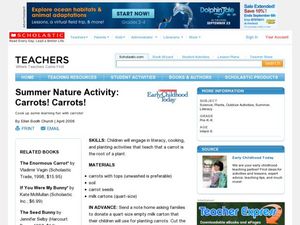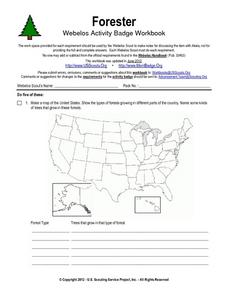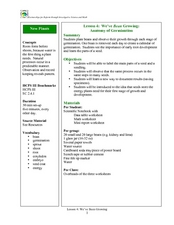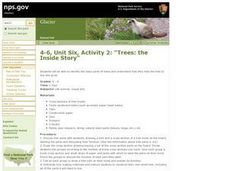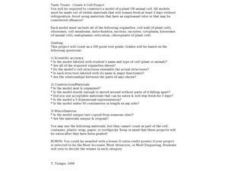Curated OER
Discussing How Plants Grow
Study how plants grow with your English language learners with a cross-curricular instructional activity revolving around pumpkins. These activities provide opportunities to practice new scientific vocabulary while practicing skills such...
Curated OER
Celebration of Trees
Second graders listen to various, grade appropriate stories about trees. They create their own construction paper trees and discuss the importance of trees to the ecosystem and the importance of taking care of them. Finally, 2nd graders...
Curated OER
How Plants Spice Up Our Lives
Third graders study plants. In this biology lesson plan, 3rd graders label and identify parts of plants, identify spices obtained from plants, and determine what part of a plant a spice comes from by using taste, touch, smell and sight.
Curated OER
Feed Me, Seymour
Students work in small groups to create posters illustrating the major facts and functions of plant organs. Within their groups, they assume the role of specialists creating specialized posters pertaining to the different parts of plants.
Curated OER
The Cell
Students visualize plant and animal cells, explain the parts of a cell and their functions and distinguish plant cells from animal cells. Working Students, in groups, must present a particular portion of a cell to the entire class.
Curated OER
Clothesline Sleuth
Third graders discover the origin of an item of clothing. In this clothing lesson, 3rd graders navigate the net to locate information related to various fabrics. Students answer questions and define vocabulary about...
Curated OER
Summer Nature Activity: Carrots! Carrots!
Students investigate reading, cooking, and planting activities that teach that a carrot is the root of a plant. In this early childhood science instructional activity, students explore the world around them as they read The Carrot Seed...
Curated OER
Fruit or Vegetable?
Watermelon is a vegetable? A tomato is a fruit? Believe it or not, this debate is decades old. Groups examine rulings by the US Supreme Court, the USDA, and state statutes before developing their own criteria to use when labeling...
Curated OER
4-H Horticulture/Garden Activity Page
As part of an exploration of plants, learners engage in projects to design greenhouses, grow vegetables, and other endeavors. This 20 question activity packet could be used as a classroom mini-lesson or as the start to a long-term project.
Curated OER
Rainforest Relationships
Young scholars provided with opportunities to explore the animals and plant life that coexist in the various layers of the tropical rainforest. They appreciate the diversity of life in each layer. Students write a report on a particular...
Curated OER
Seed Sensation
Students explore seeds through dissecting, sorting, comparing and contrasting. They draw their observations of both a closed and open seed and then they label the parts of a seed. They brainstorm where seeds come from. They compare seeds...
Curated OER
Nature's Recycling Program
Learners identify what materials make up compost. In this science of recycling lesson, students explain the benefits of composting determine how compost is a good plant fertilizer.
Curated OER
A Wild Chain Reaction
Students explore habitats. In this habitat instructional activity, students break into groups and are labeled as a part of a habitat. Students then do an activity with yarn that shows how all of the parts are connected...
Curated OER
Structure and Function of Bulbs, Corms and Rhizomes
Middle schoolers explore the concept of philanthropy and why people give. They investigate the importance of the tulip to Holland and the tradition of giving flowers away. They begin to explore the life cycle of tulips and dissect a bulb...
Curated OER
How Does Your Garden Grow?
Learners read The Garden by Arnold Lobel, plant seeds to discover what makes them grow, and record their observations in their journals.
Curated OER
Soil pH Effect on Germination of Specific Weeds
Students collect weed seeds from three varieties of weeds (knapweed, thistle, or toadflax, for example they may choose others in addition to the spotted knapweed.) They sterilize soil for thirty containers, plant seeds in sterile soil,...
Curated OER
Forester
In this forester activity, students illustrate a map that shows the types of forests growing in various parts of the country. They also identify six forest trees common to the area where they live and explain how both wildlife and humans...
Curated OER
Ecology of the Savanna-Forest Boundaries in Central Brazil
Students explore photosynthesis. In this photosynthesis lesson, students label parts of photosynthesis and take notes. Students conduct experiments on leaves, make observations and record their findings.
Curated OER
We’ve Bean Growing: Anatomy of Germination
Students identify the main parts of a seed. For this biology lesson, students explain the factors needed for the seed to grow. They record observations everyday and report findings to class.
Curated OER
Growing Jack and the Beanstalk Plants
First graders investigate how plants grow by growing their own "beanstalk", (after reading "Jack and the Beanstalk") and record their observations daily in a science journal.
Curated OER
Stem Cuttings
Pupils select the best non-flowering stems of plants and remove the leaves from the soon to be buried portion of the stem. They fill seedling flats with soil and insert the cuttings, label, and water.
Cmassengale
Photosynthesis Diagrams Worksheet
Help young botanists get to the root of photosynthesis with this series of worksheets. By completing these diagrams, learners demonstrate their understanding of the biological structures and chemical reactions that make this...
Curated OER
Trees: The Inside Story
Students explore trees. In this math lesson, students identify the basic parts of trees. Students create a model of a tree and label the parts.
Curated OER
Tasty Treats
In this biology worksheet, students construct a model of a plant or animal cell using edible materials that will remain fresh at least three days. They identify and label each part to include various organelles as listed. Students also...
